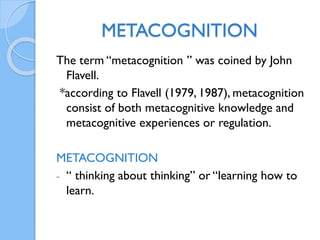
Metacognition
- 1. METACOGNITION The term “metacognition ” was coined by John Flavell. *according to Flavell (1979, 1987), metacognition consist of both metacognitive knowledge and metacognitive experiences or regulation. METACOGNITION - “ thinking about thinking” or “learning how to learn.
- 2. • Refers to higher order thinking which involves active awareness and control over the cognitive processes engaged in learning. • METACOGNITIVE KNOWLEDGE - Refers to acquired knowledge about cognitive processes, knowledge that can be used to control cognitive processes.
- 3. 3 Categories of metacognitive knowledge PersonVariables - Includes how one views himself as a learner and thinker. - Knowledge of person variables refers to knowledge about how human beings learn and process information, as well as individual knowledge of one’s own learning processes.
- 4. TaskVariables - Includes knowledge about the nature of the task as well as the type of processing demands that it will place upon the individual. - Is about knowing what exactly needs to be accomplished, gauging its difficulty and knowing the kind of effort it will demand.
- 5. StrategyVariables - Involves awareness of the strategy you are using to learn a topic and evaluating whether this strategy is effective. *META-ATTENTION -the awareness of specific strategies so that you can keep your attention focused on the topic or task at hand. *METAMEMORY -is your awareness of memory strategies that work best for you.
- 6. Omrod, includes the following in the practices of metacognition. Knowing the limits of one’s own learning and memory capacities Knowing what learning task one can realistically accomplish within a certain amount of time Knowing which learning strategies are effective and which are not Planning an approach to learning task that is likely to be successful Using effective learning strategies to process and learning new material
- 7. Monitoring one’s own knowledge and comprehension. In other words, knowing when information has been successfully learned and when its not Using effective strategies for retrieval of previously stored information. Knowledge is said to be metacognitive if it is keenly used in a purposeful manner to ensure that a goal is met.
- 8. Huitt believes that metacognition includes the ability to ask and answer the ff. types of question; What di I know about this subject, topic, issue? Do I know what I need to do now? Do I know where I can go to get some information, knowledge? How much time will I need to learn this ? What are some strategies and tactics that I can use to learn this? Did I understand what I just heard, read or saw? How will I know if I am learning at an appropriate rate? How can I spot an error if I make one? How should I revise my plan if its not working to my expectations/satisfaction?
- 9. METACOGNITION DEVELOPMENT - Researchers such as that of Fang and Cox showed that metacognitive awareness was evident in preschoolers and in students as young as eight years old. Children already may have the capacity to be more aware and reflective of their own learning. However, not may have been taught and encourage to apply metacognition.
- 10. Teaching strategies to develop metacognition; Have students monitor their own learning and thinking Have students learn study strategies Have students make predictions about information to be presented next based on what they have read Have students relate ideas to existing knowledge structures. Have students develop questions; ask questions of themselves, about what’s going on around them. Help students to know when to ask for help. Show students how to transfer knowledge, attitudes, values, skills to other situations or task.
- 11. NOVICE AND EXPERT LEARNERS - In the last twenty years, cognitive psychologists have studied the distinctions among learners in the manner they absorb or process information.They were able to differentiate expert learners from novice learners.A very important factor that separate these two types of learners mentioned is metacognition. Expert learners employed metacognitive strategies in learning .They were more aware of their learning process as they read, studied and did problem solving. Experts learners monitored their learning and consequently adjusted their strategies to make learning more effective.
- 12. Differences Between Novice and Expert Learners Aspects of Learning Novice Learning Expert Learning Knowledge in different subject *have limited knowledge in the different subject areas *have a deeper knowledge in different subject areas because they look for interrelationships in things they learn Problem solving *satisfied at just scratching the surface; hurriedly gives a solution to the problem *first try to understand the problem, look for boundaries, and create a mental picture of the problem Learningthinking Strategies *employ rigid strategies that may not be appropriate to the task at hand *design new strategies that would be appropriate to the task at and Selectively in Processing *attempts to process all information they receive *select important information to process; able to breakdown information to
- 13. THANKYOU OBAS, JOAN MAE D.
